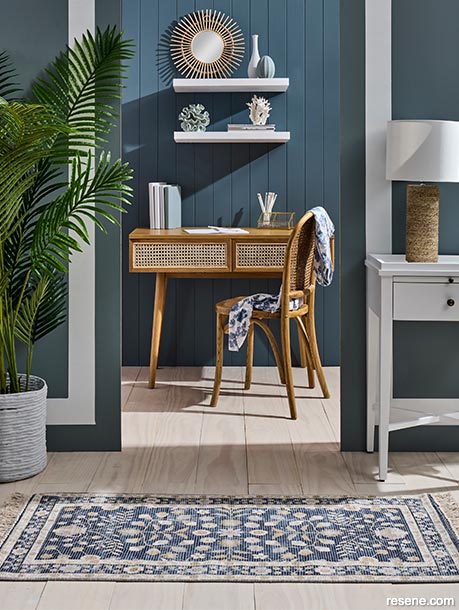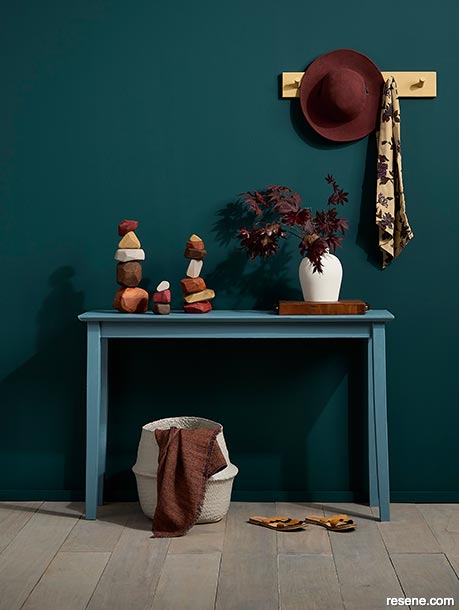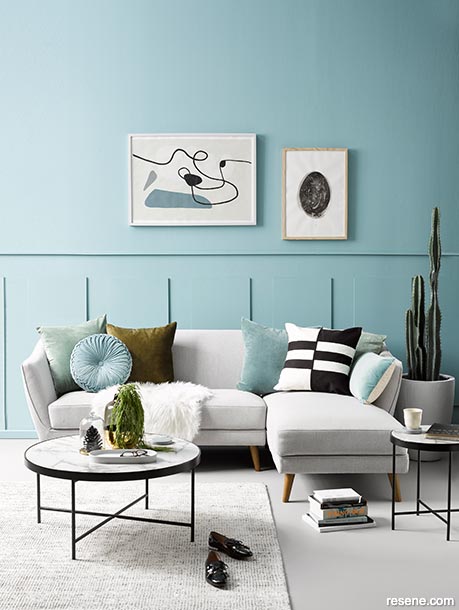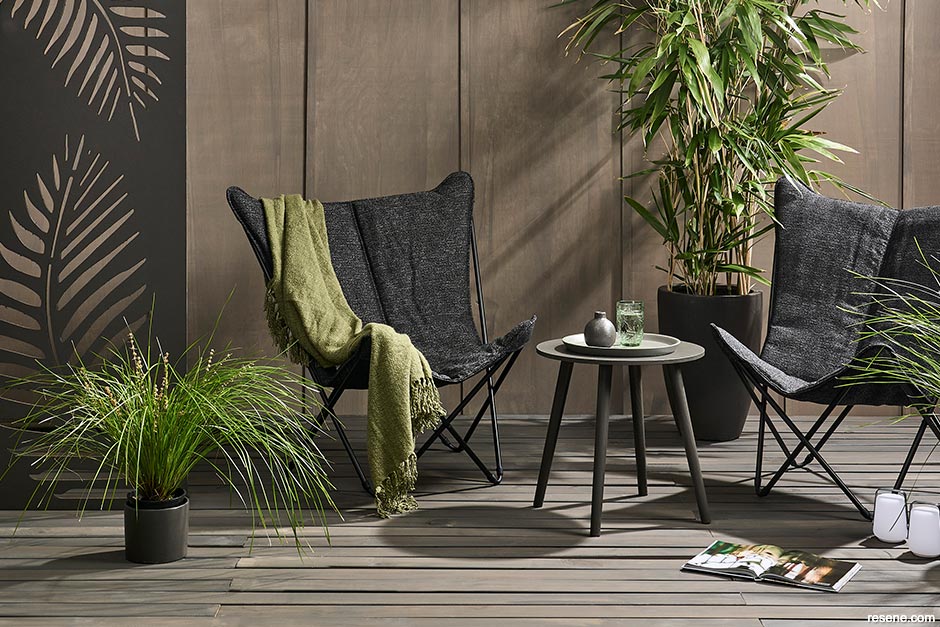From the Resene decorating blog
Our generally temperate climate, mixed with a collective love of indoor-outdoor flow and laid back beach holidays mean a coastal design style is perennially popular.

Deep teal and moody blues turn classic coastal colours into cosy.
Rear wall painted in Resene Watermark, front walls in Resene Baring Head, trim, shelves, planter and cabinets in Resene Alabaster, floor in Resene Colorwood Breathe Easy and vases in Resene Four Winds and Resene Aoraki. Desk and chair from Danske Møbler, rug and plant from Adairs, mirror from H&M Home, side table from French Country Collections. Project by Melle Van Sambeek, image by Bryce Carleton.
Weathered wood finishes, dusted blues and soft sandy neutrals invoke the easy, breezy days of summer, but how do you keep to a coastal design style white catering for cooler temperatures and cloudy days?
There are very few, if any of us, who are likely to commit to switching out our interior designs every season. But there are ways to make subtle adjustments to your interiors to add a layer of cosiness.
You can make simple decor, furnishings and ornament swaps, or perhaps you’re finding remote working allows you to spend more time at the bach in winter, and you want a more permanent feeling of plush comfort that is still connected to your coastal environment. Or perhaps you just prefer a moodier, stormier coastal experience than the traditional bright sun and clear blue skies.
Resene Colour Consultant Jackie Nicholls says the colours of the seaside are very calming and relaxing which is just one reason we love them. “They are the colours of nature, softened and gentle. White backgrounds are chalky and warm, not stark, in colours like Resene Chalk Dust, Resene Double Rice Cake and Resene Eighth Bison Hide.”
She suggests adding a touch of subtle but interesting colour with Resene Awaroa Bay and Resene Double Duck Egg Blue. “These could be used as accent colours here and there or even on furniture.
“Resene Colorwood Whitewash can also transform any woodwork or plywood, adding a dreamy softness. To make this colour scheme cosy, just add layers of texture and warm tones with jute rugs, linen curtains and cushions and perhaps a reading chair upholstered in a cream boucle fabric.”
For a more permanent warm change in your coastal decor, opt for the colours of stormier seas while keeping the same lived-in weathered look.
Teals and blue-greens are very popular right now and make a great cosier coastal alternative to sun bleached pastels or vivid cerulean blues. Try the soft yet interesting tones of Resene Boost or Resene Teal Blue on your walls paired with pale grey trim in Resene Ted, rather than a more summery white.
Resene Watermark and Resene Baring Head put a more thundercloud grey spin on muted blues, and pair well with golden wood finishes in Resene Colorwood Natural or soothing Resene Colorwood Greywash.
Darker stains are another way to give your beachy interior a cosier feel while keeping a sense of softness and a comfortably worn-looking finish. Try Resene Colorwood Bark or Resene Colorwood Ebony on interior surfaces or Resene Woodsman Smokey Ash for a warm muted grey on exterior fences.
Adding notes of burnt orange, terracotta or deep gold also add cosiness to a space, evoking the sun without brightness. Try Resene Tuscany against deep blue-greys like Resene Carpe Noctem, sandy beige Resene Hillary or a touch of Resene Liquid Gold against deep teal Resene Rolling Hills.

Earthy tones pair well with deep oceanic colours for a more complex coastal look.
Wall painted in Resene Welcome, floor in Resene Colorwood Greywash, the table in Resene Streetwise, hooks in Resene Papier Mache, vase in Resene Half Tea with board stained in Resene Colorwood Walnut, basket in Resene Settlement and balancing ‘rocks’ in Resene Waterborne Woodsman in Resene Japanese Maple, Resene Warm Kwila, Resene Riverstone, Resene Driftwood and Resene Bark. Throw from Città. Project by Shani Luckman. Image by Bryce Carleton.

Warm textiles in a mix of earthy and beachy colours soften cooler coastal tones.
Walls painted in Resene Ziggurat, floor painted in Resene Mountain Mist, tall planter in Resene Alabaster, tray in Resene Half Duck Egg Blue and DIY abstract artwork in Resene Celeste, Resene Nocturnal, Resene Rolling Stone, Resene Blue Bayoux and Resene Alabaster with frame in Resene Half Duck Egg Blue. Coffee and side tables, sofa, cushions and rug from Nood, faux sheepskin from Mitre 10. Project by Laura Lynn Johnston. Image by Wendy Fenwick.
If your colour tastes tend toward more minimalist and monochrome palettes, then you can still cosy up your beach vibes by embracing on-trend earthy shades.
Think about parched tones like deep reddish brown Resene Zibibbo with an unexpected note of sunset orange Resene Meteor and Resene Half Spanish White, or opt for the dark coffee brown of Resene Brown Bramble with gold Resene Pizza and deep beige Resene Stonewall.
These shades still connect your coastal space firmly in the surrounding natural environment while adding a little dramatic edge.
Sandy neutrals are another obvious way to go for a coastal look, but veer towards deeper or mid-toned neutrals rather than pale and oaty. Try subtly golden Resene Haystack with a muted blue like Resene Kashmir Blue, and deep beige Resene Stonewall. Try sandy greige Resene Napa in a tonal layered space with Resene Half Napa and Resene Quarter Napa, and a bold accent of Resene Masala and soothing Resene Sea Fog.

When we talk about adding cosiness to a coastal interior, or in fact, any interior, we are often talking about softness, both literally and sometimes visually.
What that means is giving furniture and even walls or other hard surfaces a tactile quality that makes us feel wrapped in comfort. For example a low sheen or matte paint finish in Resene SpaceCote Flat or Resene SpaceCote Low Sheen will give walls a softer, suede-like finish, almost blurring the edges of a room. In contrast, a higher sheen finish will bounce more light around for a brighter, slightly harder-edged finish. Gloss finishes can be great for maximising a sense of brightness in a space, but a cosier, flat finish just calms things down a bit – with the bonus of covering up slight imperfections in the surface.
But texture isn’t just about shine level. As well as adding different textures like wool or suede in your furnishings to bring a softer, warmer layer to your beachy rooms, think about other visual textures.
You could try a sponged, limewashed or rag-effect with Resene FX Paint Effects Medium which can be mixed with your choice of colour, create a Mediterranean-style plaster effect with Resene Sandtex tinted to a toasty blush shade like Resene Wax Flower or add a rust effect to outdoor decor items with Resene FX Faux Rust Effect.
The idea of creating a warmer, cosier coastal interior is tied to the modern Cottagecore trend. Cottagecore is really about getting back to nature and creating a place to retreat and cuddle up, whatever the season.
Very much like a coastal feel, Cottagecore is about stripping away artifice for a simpler existence. Think timber flooring against panelled walls, curtains and other elements like a stone fireplace. Natural light is also key to this look. Try to incorporate heightened ceilings wherever possible.
The key is to think carefully about what coastal style means to you and how that ties in with your idea of what makes a space cosy and comfortable.










March 31, 2023
For help choosing colours to suit your projects, visit your local Resene ColorShop, ask a Resene Colour Expert online or book a Resene Colour Consultation.
Book a colour consult | Ask a Colour Expert | Ask a Paint Expert
Resene's decorating blog
Paint your home beautiful! Discover the latest decorating trends, tips and colour news.
![]()
Previous «
Rich warm colours to welcome the autumn months
![]()
Blog home
View the latest trends, tips and news
![]()
» Next
How to pair paint with wallpaper